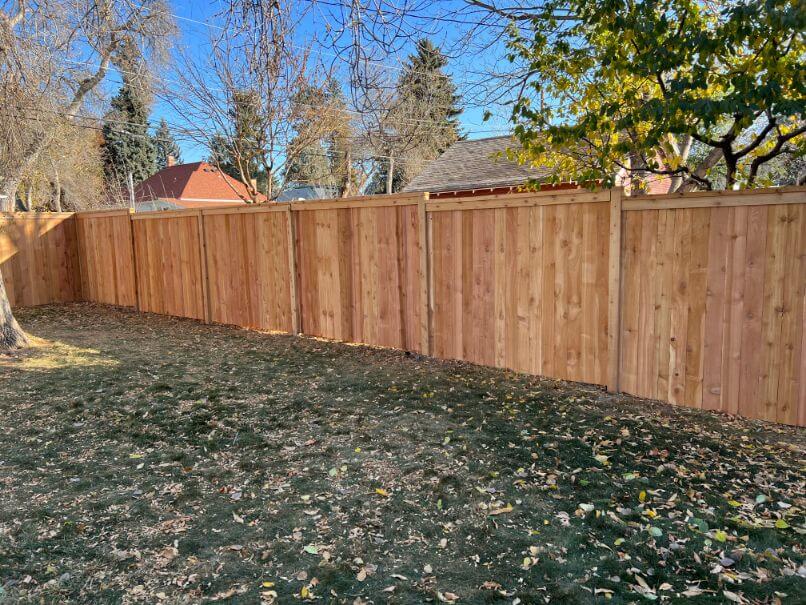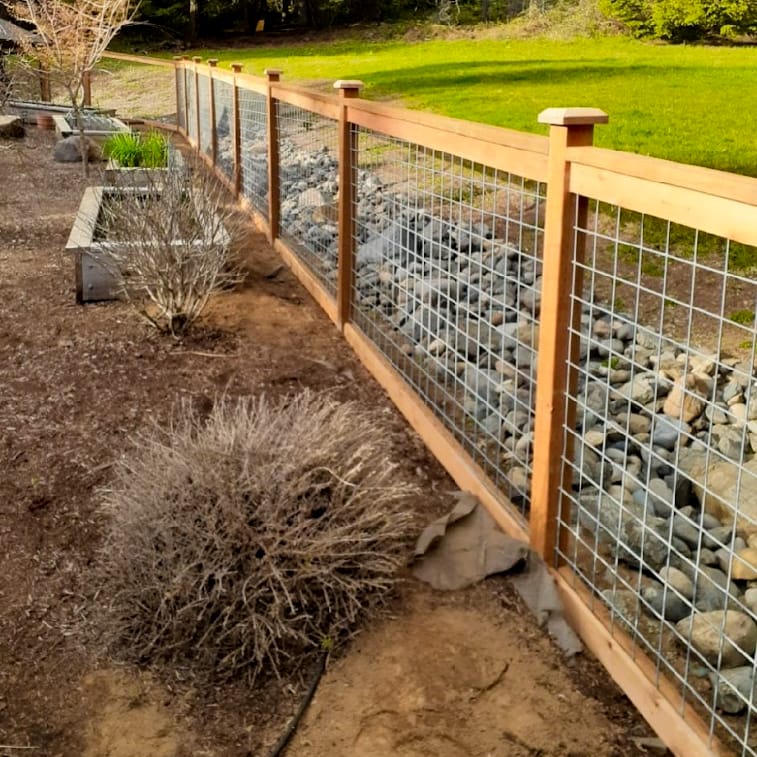All Categories
Featured
When selecting a fencing for your home, it's crucial to consider elements like expense, toughness, maintenance, and aesthetic charm. Three of one of the most preferred materials for commercial and residential fences are wood, vinyl, and light weight aluminum. Each deals one-of-a-kind benefits and some downsides, making it essential to review your needs prior to choosing. Below, we compare the pros and disadvantages of these products to help assist your option.
Timber Secure Fencing. Pros:
![]()
Natural Aesthetic: Wood fences are recognized for their classic, all-natural look. They can conveniently mix right into the majority of landscapes and enhance the beauty of your home or business. Whether you're aiming for a rustic appearance or a much more refined surface, timber can be customized with paint, stain, or sealer. Personalization: Wood is just one of one of the most flexible materials, permitting a broad variety of designs, such as picket fencings, privacy fencings, and ranch-style units. It's easy to readjust the layout to fit the particular demands of your property. Budget-friendly: Normally, wood fencings come at a reduced initial price contrasted to vinyl or aluminum, making them a cost-effective option for those on a budget. Disadvantages:
Maintenance Needs: Timber fences require routine upkeep to maintain their elegance and capability. This consists of discoloration or painting to protect against rot, termites, and climate damage. Without appropriate treatment, wood can degrade over time. Shorter Lifespan: Contrasted to vinyl or aluminum, wood fencings tend to have a shorter lifespan, especially in areas with severe weather. Harsh problems, such as hefty rain, moisture, or snow, can cause timber to weaken much more promptly. Prone to Damages: Timber fencings are susceptible to damage from pests, consisting of termites, along with natural wear from weather. They might likewise warp or crack if not effectively maintained. Plastic Fence. Pros:
Low Maintenance: One of the primary benefits of plastic fencings is that they require minimal upkeep. Unlike wood, plastic does not need to be painted, sealed, or tarnished. It's immune to fading, discoloration, and cracking, which conserves time and money on maintenance. Sturdiness: Plastic is known for its capability to withstand severe weather conditions without degrading. It's unsusceptible pests like termites, and its resistance to moisture and UV rays guarantees it stays looking helpful for several years. Long-Lasting: A plastic fencing can last up to 30 years or even more, making it an excellent lasting financial investment. Several suppliers provide warranties, even more improving its value. Selection of Styles: Plastic fencings are offered in different colors and styles, including those that mimic wood. You can pick from personal privacy, picket, or attractive styles, giving flexibility to match your home or organization. Disadvantages:
![]()
Greater Upfront Expense: Vinyl fencings tend to have a higher first cost than wood. While the long-term financial savings on upkeep are substantial, the ahead of time investment might be a deterrent for some homeowners. Restricted Modification: Plastic fencings can be found in standard styles, and while styles and colors are diverse, you may not have as much flexibility for modification compared to wood. Fracturing in Cold Climates: While vinyl is sturdy, in extremely chilly environments, it can become weak and split upon effect, which can be bothersome in locations with severe wintertimes. Light weight aluminum Fencing. Pros:
Reduced Upkeep: Light weight aluminum fences are recognized for their low-maintenance needs. Unlike timber, aluminum does not rust or wear away, and it doesn't require to be painted or sealed. This makes it a wonderful option for those that desire a problem-free option. Toughness and Strength: Light weight aluminum is a robust product that stands well to severe climate condition. It's an excellent selection for seaside areas where deep sea deterioration is a worry, as it's resistant to rust. Aesthetic Appeal: Light weight aluminum fencings offer a tidy, stylish look, usually used for attractive functions. They're offered in different designs, consisting of decorative styles, and can include a high-end feel to your property. Security: Aluminum fences are resilient and offer wonderful safety, especially when mounted with locks or entrances. Their tough construction gives a trustworthy obstacle against undesirable entrance. Disadvantages:
![]()
Greater First Price: Light weight aluminum fences often tend to be much more costly than timber, especially if you go with decorative layouts. The ahead of time price may be excessive for some. Less Privacy: Light weight aluminum fences generally have wider voids between the slats, which means they supply less personal privacy than timber or vinyl fencings. Light weight aluminum may not be the best alternative if seclusion is a concern. Denting Issues: While aluminum is rust-resistant, it is at risk to nicking or bending if struck with force. For instance, a lorry mishap or hefty influence can trigger long-term damage to the fencing. Which Fence Material is Right for You? Selecting the best fence depends upon several factors, including your budget, design preferences, upkeep ability, and the setting in which you live. If you want a natural look and are gotten ready for regular maintenance, timber may be the right alternative. If low-maintenance and long life are your priorities, plastic is a great choice. For those that favor a sleek, modern appearance with very little treatment, light weight aluminum offers a long-lasting, secure remedy.
Eventually, each fence product has its cons and pros, so it is necessary to review what matters most for your specific demands. Think about the climate, the level of privacy you call for, and just how much upkeep you're prepared to commit to, and you'll find the excellent fence for your residential property.
Timber Secure Fencing. Pros:

Natural Aesthetic: Wood fences are recognized for their classic, all-natural look. They can conveniently mix right into the majority of landscapes and enhance the beauty of your home or business. Whether you're aiming for a rustic appearance or a much more refined surface, timber can be customized with paint, stain, or sealer. Personalization: Wood is just one of one of the most flexible materials, permitting a broad variety of designs, such as picket fencings, privacy fencings, and ranch-style units. It's easy to readjust the layout to fit the particular demands of your property. Budget-friendly: Normally, wood fencings come at a reduced initial price contrasted to vinyl or aluminum, making them a cost-effective option for those on a budget. Disadvantages:
Maintenance Needs: Timber fences require routine upkeep to maintain their elegance and capability. This consists of discoloration or painting to protect against rot, termites, and climate damage. Without appropriate treatment, wood can degrade over time. Shorter Lifespan: Contrasted to vinyl or aluminum, wood fencings tend to have a shorter lifespan, especially in areas with severe weather. Harsh problems, such as hefty rain, moisture, or snow, can cause timber to weaken much more promptly. Prone to Damages: Timber fencings are susceptible to damage from pests, consisting of termites, along with natural wear from weather. They might likewise warp or crack if not effectively maintained. Plastic Fence. Pros:
Low Maintenance: One of the primary benefits of plastic fencings is that they require minimal upkeep. Unlike wood, plastic does not need to be painted, sealed, or tarnished. It's immune to fading, discoloration, and cracking, which conserves time and money on maintenance. Sturdiness: Plastic is known for its capability to withstand severe weather conditions without degrading. It's unsusceptible pests like termites, and its resistance to moisture and UV rays guarantees it stays looking helpful for several years. Long-Lasting: A plastic fencing can last up to 30 years or even more, making it an excellent lasting financial investment. Several suppliers provide warranties, even more improving its value. Selection of Styles: Plastic fencings are offered in different colors and styles, including those that mimic wood. You can pick from personal privacy, picket, or attractive styles, giving flexibility to match your home or organization. Disadvantages:

Greater Upfront Expense: Vinyl fencings tend to have a higher first cost than wood. While the long-term financial savings on upkeep are substantial, the ahead of time investment might be a deterrent for some homeowners. Restricted Modification: Plastic fencings can be found in standard styles, and while styles and colors are diverse, you may not have as much flexibility for modification compared to wood. Fracturing in Cold Climates: While vinyl is sturdy, in extremely chilly environments, it can become weak and split upon effect, which can be bothersome in locations with severe wintertimes. Light weight aluminum Fencing. Pros:
Reduced Upkeep: Light weight aluminum fences are recognized for their low-maintenance needs. Unlike timber, aluminum does not rust or wear away, and it doesn't require to be painted or sealed. This makes it a wonderful option for those that desire a problem-free option. Toughness and Strength: Light weight aluminum is a robust product that stands well to severe climate condition. It's an excellent selection for seaside areas where deep sea deterioration is a worry, as it's resistant to rust. Aesthetic Appeal: Light weight aluminum fencings offer a tidy, stylish look, usually used for attractive functions. They're offered in different designs, consisting of decorative styles, and can include a high-end feel to your property. Security: Aluminum fences are resilient and offer wonderful safety, especially when mounted with locks or entrances. Their tough construction gives a trustworthy obstacle against undesirable entrance. Disadvantages:

Greater First Price: Light weight aluminum fences often tend to be much more costly than timber, especially if you go with decorative layouts. The ahead of time price may be excessive for some. Less Privacy: Light weight aluminum fences generally have wider voids between the slats, which means they supply less personal privacy than timber or vinyl fencings. Light weight aluminum may not be the best alternative if seclusion is a concern. Denting Issues: While aluminum is rust-resistant, it is at risk to nicking or bending if struck with force. For instance, a lorry mishap or hefty influence can trigger long-term damage to the fencing. Which Fence Material is Right for You? Selecting the best fence depends upon several factors, including your budget, design preferences, upkeep ability, and the setting in which you live. If you want a natural look and are gotten ready for regular maintenance, timber may be the right alternative. If low-maintenance and long life are your priorities, plastic is a great choice. For those that favor a sleek, modern appearance with very little treatment, light weight aluminum offers a long-lasting, secure remedy.
Eventually, each fence product has its cons and pros, so it is necessary to review what matters most for your specific demands. Think about the climate, the level of privacy you call for, and just how much upkeep you're prepared to commit to, and you'll find the excellent fence for your residential property.
Latest Posts
The Restroom Upgrade Every Detroit Home Is Worthy Of
Published Apr 19, 25
1 min read
Affordable Car Repair Services at Montclare Auto Repair - Don’t Wait, Act Now!
Published Apr 19, 25
2 min read
Unlock Exclusive Discounts with WyHy's Love My Lending institution Rewards
Published Apr 19, 25
1 min read
More
Latest Posts
The Restroom Upgrade Every Detroit Home Is Worthy Of
Published Apr 19, 25
1 min read
Affordable Car Repair Services at Montclare Auto Repair - Don’t Wait, Act Now!
Published Apr 19, 25
2 min read
Unlock Exclusive Discounts with WyHy's Love My Lending institution Rewards
Published Apr 19, 25
1 min read